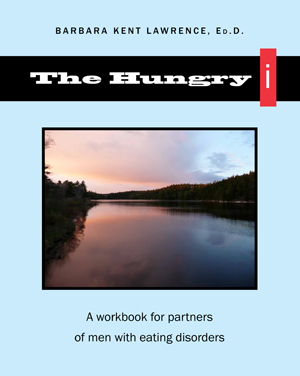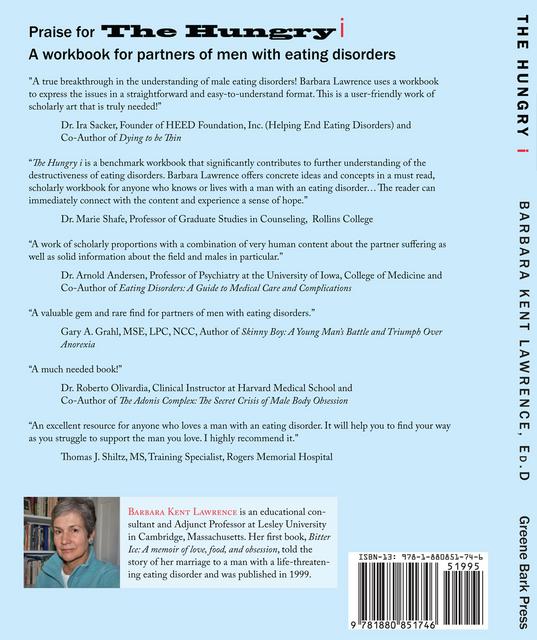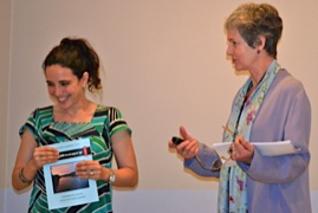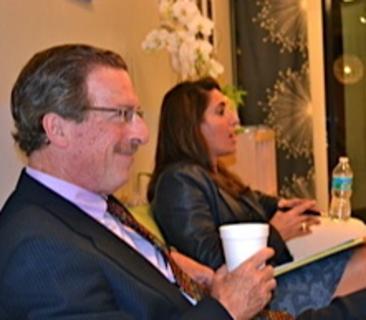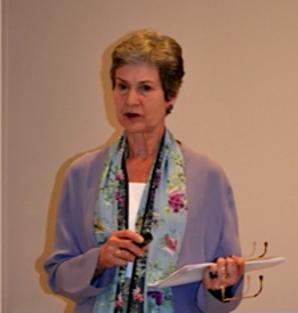One morning my partner Bob and I were going up the long escalator at the Harvard Square subway/T stop. I noticed a young man looking at me intently, as he stood on the descending escalator. When we were parallel, he pointed to me and asked, " Are you Barbara Kent Lawrence?" "Yes," I replied, surprised he knew my name. "You saved my life!" he exclaimed." "How?" I asked. "Bitter Ice," he replied, and then was gone. I've written this book for him, and all the other men and women who are partners of men with eating disorders.
Barbara Kent Lawrence
Review in the Hamilton-Wenham Chronicle: January 27, 2011
by Lucy R. Sprague Frederickson/Correspondent
A MALNOURISHED EGO
To read the entire review go to:
http://www.wickedlocal.com/hamilton/fun/entertainment/books/X1791704092/A-malnourished-ego#axzzlFqtX0aYB
A malnourished ego
Local resident publishes book to help men with eating disordersZoom Photos
Courtesy photo
Barbara Lawrence author of "The Hungry i"
By Lucy R. Sprague Frederiksen / Correspondent
Hamilton-Wenham Chronicle
Posted Jan 27, 2011 @ 01:20 PM
Last update Jan 27, 2011 @ 05:45 PM
Hamilton-Wenham — Hamilton resident Barbara Kent Lawrence describes her new book, “The Hungry i: A workbook for partners of men with eating disorders”, published in Sept. 2010, as a workbook. Following up on her 1999 publication of “Bitter Ice”, a memoir of her 25-plus years of marriage to an alcoholic man with a severe eating disorder, the goal of her latest book is to help individuals recognize the symptoms in their partners and cope with the issues. Even without an eating disorder connection, the memoir and workbook offer a lot to anyone who reads them. Lawrence will be speaking about her book at the Hamilton-Wenham Public Library on Wed. Feb. 2 from 7-8 p.m.
It is difficult to consider the two books separately as they are interwoven. Lawrence quotes from her memoir in “The Hungry i”, in addition to providing statements from men who have eating disorders. Her memoir is a lyrically written exploration of a painful subject; painful for her to have endured, painful to read after the fact.
It raises the age-old question of why smart women stay in bad marriages. Lawrence does not shy away from that consideration, fully taking responsibility for her own decisions, as a result of enabling and co-dependency, in themselves psychological disorders in partners of those with other disorders. In “The Hungry i”, she moves to the aftermath of her divorce and therapy to help others, by providing information and education that she may not have had available during her own relationship. She does not encourage readers to seek divorce immediately, only to know the issues, and understand their own role in relationship to their partners’ behaviors; and that no one can deal with the issues by themselves. After all, she “stood by her man” for over 25 years, which she thought was the approved behavior on her part.
The format of the book is easy to read. The well-written explanation sections are full of details of symptoms, complete with lists of behavioral and emotional manifestations. She intersperses the narrative with summaries, full of references to readings and Internet resources. There is a series of exercises for readers to help them decide if their partners have some or all of the symptoms. Readers will understand themselves better.
In the Time Outs section she helps readers choose ways to make themselves feel good and have fun. In one exercise, she recommends readers start a journal, quoting Socrates, “The unexamined life is not worth living.”
In another, the exercise helps a reader explore his or her context and that of the partner using online sites to detail what was happening in the world during critical times in the lives of both members of the relationship. Lawrence, who studied anthropology as well as education, has done extensive research in cultural anthropology as well as psychology and cites researchers and her own conclusions that eating disorders are a cultural dysfunction as well as a psychological one.
People typically associate eating disorders with women, specifically adolescent girls and occasionally older women. Clearly in these cases, eating disordered women have an obsession with thinness due in part to their own psychological issues and also the societal emphasis on appearance. Surprisingly, one in every four or five persons with an eating disorder is now male, and the percentage is growing as more men struggle with their conflicting roles in a changing society, where appearance and surface qualities are reinforced without the support of a nurturing family or community.
The adage says, “It takes a community to raise a child;” as a result of reading this book, it may also be added, “It takes a community to nurture any individual of any age.” It is not just rich, white, stubborn women or homosexual men, either. Both men and women with eating disorders suffer from a “malnourished ego”, hence the hungry “i” in lower case of the title of Lawrence’s book.
Men are less likely to seek treatment, more likely to be misdiagnosed when they do, and less likely to find treatment amid the many programs designed for adolescent females. And when one malnourished ego begins a relationship with another, the stage is set for a dysfunctional relationship.
Other exercises ask readers to do an unusual family tree, one that highlights health and emotional issues in the eating disordered person and his partner, in their parents and grandparents. Interestingly enough, hospitals are doing these family constellations as part of a diagnostic process; the practice identifies patterns of health and illness over time and possible genetic predispositions. A parallel exercise asks reader to list their greatest strengths and weaknesses, the negatives and positives in their lives. Subsequent exercises use these lists again.
What one realizes in the reading is that once again the causes and symptoms of an eating disordered person are normal coping skills stretched to beyond the normal range of societal acceptance, which makes the rest of us not so different from those with eating disorders, just lucky that we never had that particular combination of familial, genetic and social stresses. Lawrence’s writing encourages partners, and other members of a community, not to judge, just understand; to help if you can, and at least do no further harm. And as Lawrence says, “The truth can make us free.”
Copyright 2011 Hamilton-Wenham Chronicle. Some rights reserved
What experts in the field of eating disorders are saying about:
The Hungry i.
"A true breakthrough in the understanding of Male Eating Disorders! A must read for everyone in the Field of Eating Disorders. So little is known of this topic. Barbara Lawrence uses a workbook to express the issues in a straight forward and easy to understand format. This is a user friendly work of scholarly art that is truly needed! I am delighted to endorse The Hungry i and wish it the success it deserves."
Dr. Ira M. Sacker, Eating Disorders Specialist
Dr. Sacker is the author of best selling book: Regaining You Self: Breaking Free from the Eating Disorder Identity and co-author of the ground-breaking book Dying to be Thin. He is a visiting professor of Pediatrics at New York University Langone Medical Center and Bellevue Medical Center, maintains a private practice, and is a leading expert in the field of eating disorders.
TO ORDER YOUR COPY OF
THE HUNGRY i: a Work Book for partners of men with eating disorders
The Work Book is available at greenebarkpress.com, amazon.com and through Gurze Books.
For a signed copy, email the author at bkl@barbaralawrence.com.
PRICE: $19.95 plus shipping
To book a presentation by Barbara Kent Lawrence or other media opportunities, please contact Rob at Inception Marketing Group (IMI Group), 778-330-4226, desaderal@yahoo.com
Joanna Kandel, Director of the Alliance for Eating Disorders Awareness in West Palm Beach , Florida and the author at a reading and presentation in January, 2011
Members of the audience and the author enjoyed a lively and interesting discussion after the presentation.
